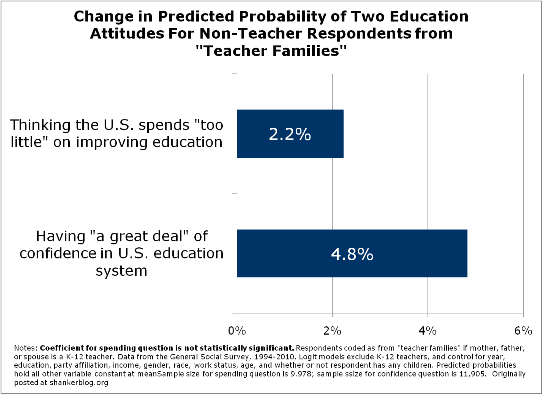Matt Damon, Jon Stewart And The "Teacher In The Family Effect"
Over the past year or so, two high-profile celebrities – Jon Stewart and Matt Damon – have expressed skepticism about the market-based education reform policies currently spreading throughout the U.S. One cannot help but notice that they share one characteristic that they both acknowledge has helped to guide their opinions: Their mothers were both PK-12 educators. I’m also the son of a teacher and I know that this has had a substantial effect on my opinions about public education. No doubt the same is true of people who are married to teachers.
It’s hardly surprising that your occupation can help to influence the views of your family members, especially those pertaining directly to that career (i.e., education policy and teachers’ families). But I found myself wondering if there was some way to get a sense of just how strong this “effect” might be. In other words, how much more likely are non-teachers from “teacher families” – those with a mother, father, or spouse who is a K-12 teacher – to hold different views toward education policy, compared with non-teachers who don’t have any teachers in their immediate families.
Let’s take a very quick look.
In order to examine this question statistically, one must, as always, account for the characteristics of individuals from “teacher families." For instance, people whose mothers or fathers are teachers are also more likely to have other characteristics, such as more education. If these characteristics are also associated with particular views on education policy, one must control for them.
My simple models (which limit the sample to respondents who are not K-12 teachers) control for age, income, gender, race, education, party identification, year, work status, and whether or not one has any children. In order to boost my sample size (because the number of people from “teacher families," spouse or parent, is relatively low), I pool General Social Survey (GSS) data between 1994 and 2010.
I’m looking at two different questions as my outcomes – one about the level of education spending, and the other about the degree of confidence in the U.S. education system. In both cases, due to sparseness, I combine the responses to construct “yes/no” variables – one measuring whether respondents have “a great deal” of confidence in the U.S. education system, and the other measuring whether respondents think the U.S. spends “too little” on improving education.
The graph below presents the change in probability of having these two views associated with being from a “teacher family," holding the “effect” of all other variables constant.

The “effects” were not quite as strong as I might have anticipated. Actually, for the spending question, there is no statistically significant difference between non-teacher respondents from “teacher families” and those who aren’t. (Although not relevant for these results, it should be noted that most Americans, like most Americans who have a teacher in the family, do indeed think that we spend too little on education – see here.) The 2.2 percentage point increase in the probability of thinking the U.S. spends “too little” on education is therefore properly regarded as just noise. This is a somewhat surprising result, one that persists even when I try different sample and model configurations (e.g., including teachers in the sample, breaking up the question responses differently and using different models, defining “teacher family” in terms of parents only, removing independent variables, etc.).
There was, on the other hand, a stronger (and statistically significant at any conventional level) association between being from a “teacher family” and having “a great deal” of confidence in the U.S. education system. Respondents from “teacher families” were more likely to hold this view by almost 5 percentage points, which is a rather substantial change, among the strongest associations of all the variables included in my model. It seems that having a spouse or parent who is a K-12 teacher is associated with a greater likelihood of having high confidence in our educational institutions.
Needless to say, these are simple models, and the questions available in the GSS do not provide a particularly good sampling of the most controversial issues in education policy today (e.g., high-stakes testing). Moreover, there is certainly no reason to think that having a teacher as a parent or spouse should be associated with any particular view on most education issues (as is evident in the results for the spending question).
Still, while the “teacher in the family effect” is not as strong as I might have thought in the case of the spending attitudes variable, there is tentative evidence here that being very close to a teacher (i.e., a parent or spouse) does exert some influence on one’s opinions of education, independent of other key characteristics, such as income and educational attainment.
- Matt Di Carlo

I fall off your scale. No teachers in my family yet I have very strong opinions on public education and the wrongheaded path it is currently on in this country.
Please work up another analysis on something else so I'll fit into that one, ok?! I want to feel included!
Great article Matt, as always. It was thought provoking. I enjoyed meeting you and Esther. Keep up the great work!